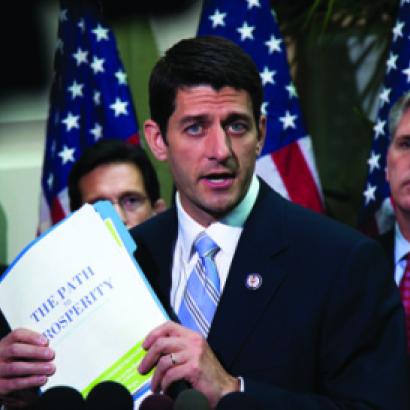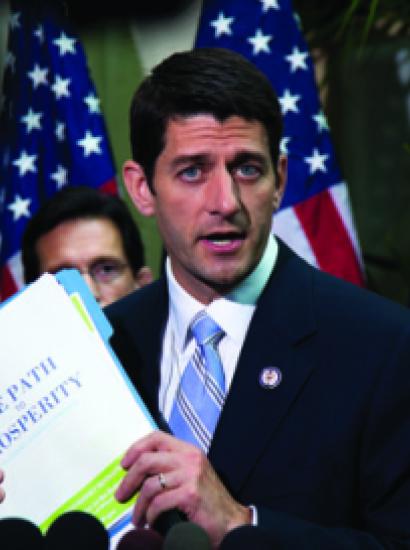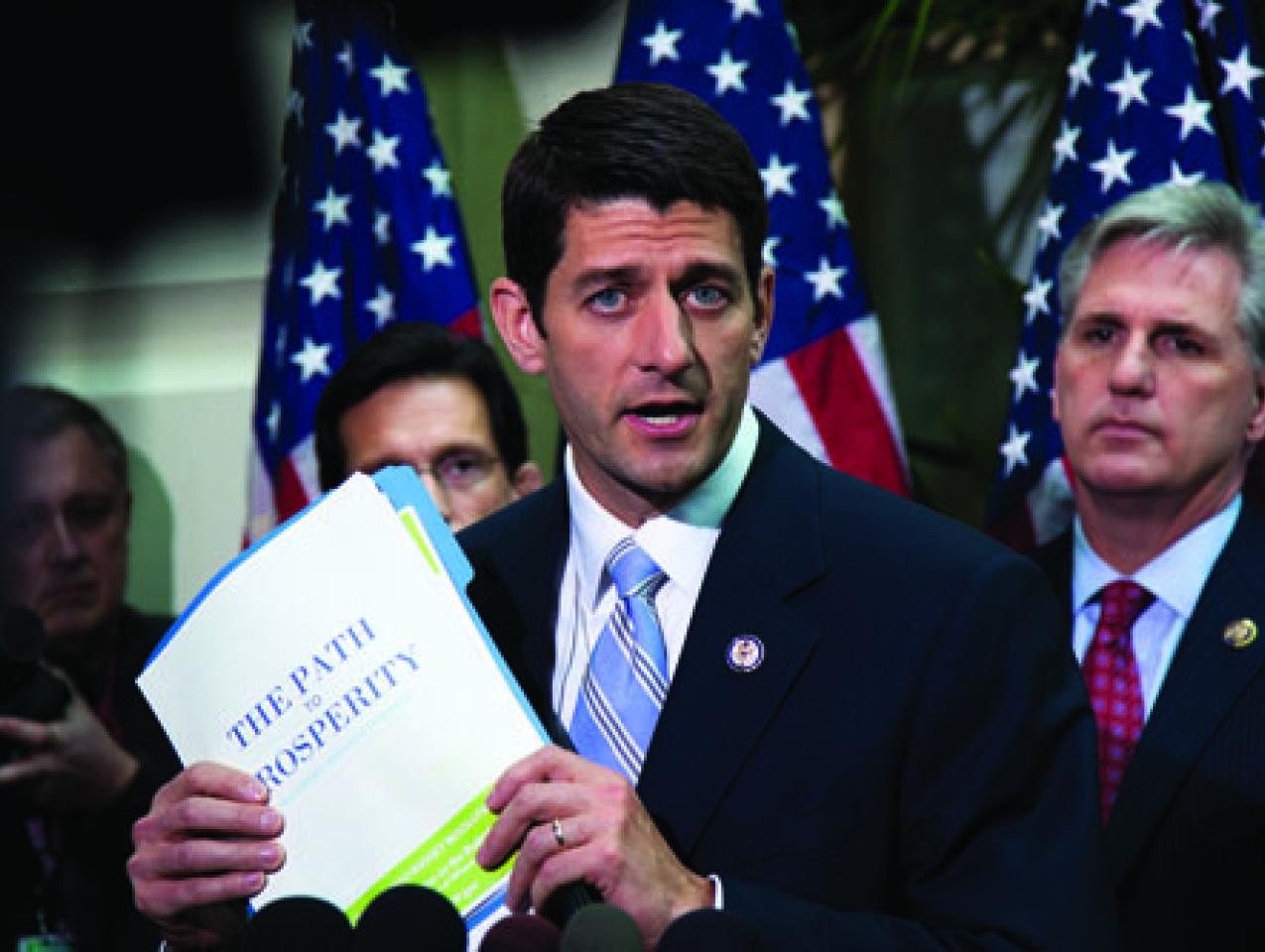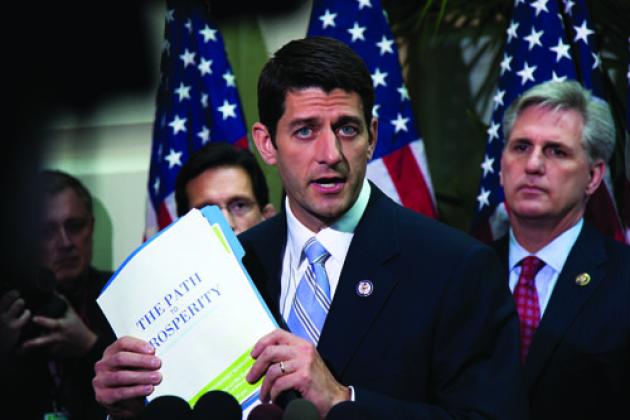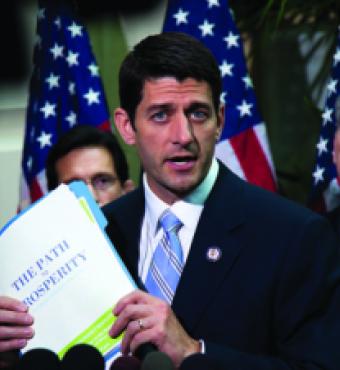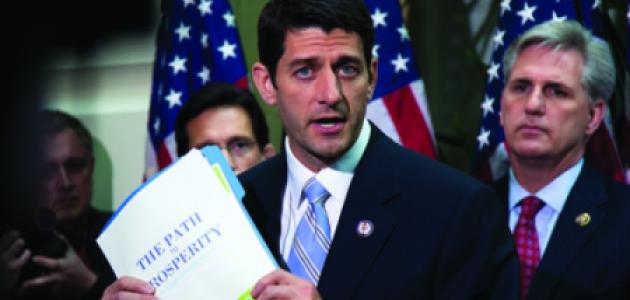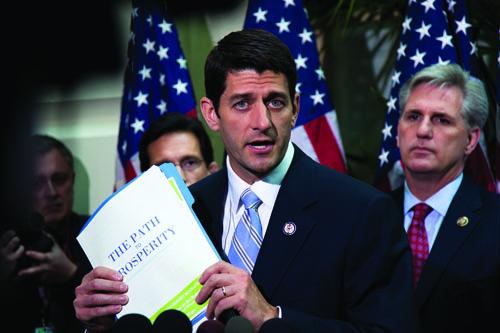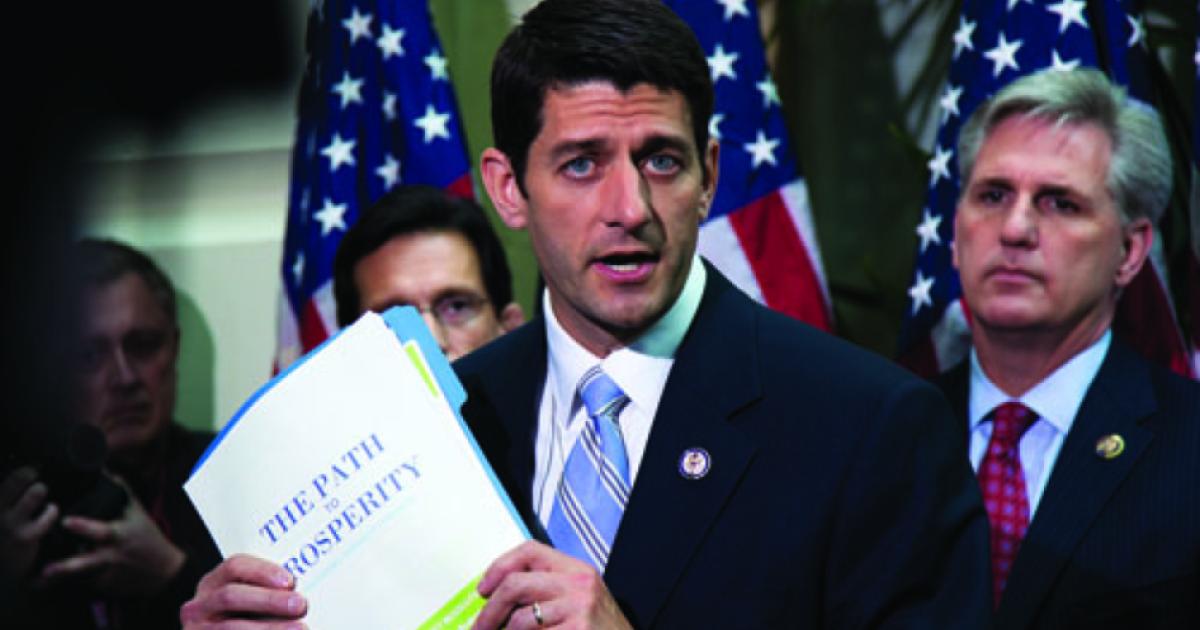- Economics
- Budget & Spending
- Law & Policy
- Regulation & Property Rights
- Health Care
- History
- Contemporary
- World
- Politics, Institutions, and Public Opinion
- Campaigns & Elections
- The Presidency
- Congress
- Civil Rights & Race
Peter Robinson: The chairman of the House Budget Committee, Congressman Paul Ryan, a Republican, has represented the First District of Wisconsin since 1999. A native of Janesville, Wisconsin, he is notable in my view for two particular attainments. In college he worked for Oscar Mayer as a driver of the Wienermobile, and this past April he presented the Path to Prosperity, also known as the Ryan budget or the Ryan proposal, which is in my judgment the most comprehensive, conservative proposal for reform of the federal government since the Contract with America of a generation ago. Now he is in California to talk about one aspect of his reform proposal, health care. Congressman Ryan, welcome to California.
Representative Paul Ryan: Great to be here. Thanks for having me, Peter.
Robinson: On February 25, 2011, President Obama held a health care summit at Blair House across the street from the White House. You spoke up: “We don’t think the government should be in control of all of this. We want people to be in control. And that at the end of the day is the big difference. Now we’ve offered lots of ideas all last year, all this year, because we agree that the status quo is unsustainable, it’s got to get fixed. It’s bankrupting families; it’s bankrupting our government; it’s hurting families with pre-existing conditions. We all want to fix this, but we don’t think that this is the answer to the solution, and all of the analysis we get proves that point. Now I’ll just simply say this, and I respectfully disagree with the vice president about what the American people are or are not saying or whether we’re qualified to speak on their behalf. We are all representatives of the American people; we all do town hall meetings; we all talk to our constituents. And I’ve got to tell you the American people are engaged. And if you think they want a government takeover of health care I would respectfully submit you’re not listening to them.” We’ll come to health care, but here is the first question: where do you come from? Where do you get off talking back to the president of the United States? Nobody would describe you as arrogant, but you sure are sure of yourself. Where does it come from?
Ryan: Well, I’m a conservative. My thing is I am not trying to be somebody other than who I am. So I’m not trying to fake it, I’m just who I am. And it was very clear to me at that moment in that room—we were there for six or seven hours—that what they were trying to do was sort of muddle the differences, sort of haze the moment and make it as if we just have subtle differences. That was not the case. We had sharp differences between our approaches to government, health care in particular, and I just wanted to basically enunciate that. Obviously I do not think the president enjoyed listening to what I was saying.
Robinson: He did not look happy.
Ryan: Look, these are coequal branches of government. He’s not the king; he’s the president. He’s elected just like the rest of us. We’re all representatives of the people, and I just wanted to pass on to him what the people I represent are telling me.
Robinson: From the summit, again, I am quoting you: “We agree that the status quo [on health care] is unsustainable.” The United States spends 17 percent of its GDP on health care. The next nearest country, Switzerland, spends 11 percent. And costs are rising faster than inflation. So, President Obama says: here is ObamaCare, everybody gets health insurance, we are going to cover everybody, and we will put in some regulation to hold down the costs. What’s wrong with that?
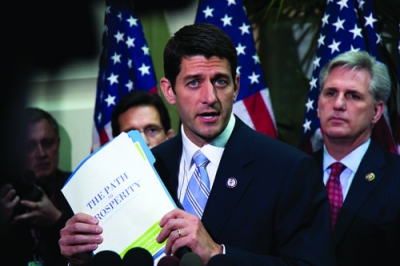
House Budget Committee Chairman Paul Ryan, R-Wisconsin, holds up a copy of the 2012 Republican budget proposal during a news conference last April. The Path to Prosperity called for significant changes to Medicare and Medicaid and a $6.2 trillion cut in government spending.
Ryan: He could learn from the Swiss, actually. They have a private system. What he wants to do is erect a government-run system rather than going straight toward a single-payer system, which is what he has always acknowledged he was for.
Robinson: Single payer would be the government?
Ryan: A socialized medicine system, right, a government-run system. This is sort of a two-step approach to it. So what you are going to get out of this kind of a system are basically five or six really large insurance companies, sort of like public utilities. They are de facto run by the government, giving you different shades of the same color of insurance, and that just doesn’t work. So it is sort of a fatal conceit—this notion that we in Congress will pass a vague law and then delegate all the power and authority to these bureaucrats in the federal government, who will micromanage these affairs of our lives like health care. It doesn’t work. That is where the president’s law takes us, and I for one would like to prevent this from happening versus watch this get rolled into law and see the system collapse. I have no doubt in my mind that this will collapse the quality and the cost of our health care system. And so I’d rather prevent that from happening, versus trying to clean up the mess after all the collateral damage has occurred.
Robinson: You do not want to pick and choose ObamaCare; you want repeal.
Ryan: Absolutely. Because the fundamental architecture is hollow; it’s wrong; it’s based upon a faulty premise.
Robinson: OK.
Ryan: This is going to be the most important election in our generation. I know it’s a cliché and people keep saying it, but this time is different, and health care is the center of it all. You cannot address this country’s fiscal and economic problems unless you address health care. So the president has put down his marker, he has made his law, and that law is going to dramatically transform America, just like the president said he aspired to do. And so this is going to be a huge issue. It is really a question of who you want to be in charge of health care: you or the government bureaucrats. That is the big difference at the end of the day.
POLITICAL REALITIES
Robinson: Let me quote from your prepared remarks for later today [a speech at the Hoover Institution on September 27, 2011]: “We can win these fights. The challenge will be to summon the courage to offer the nation a true choice of two futures on health care.” All the American people have to do is understand what you are putting forward and they will support it?
Ryan: I am not confident enough to say all we have to do is explain it and they will support it, but I am comfortable enough to say let us give them the choice. We need to kick this thing upstairs to the American people. No twelve-member supercommittee is going to solve all the country’s problems by Thanksgiving, nor should they. This is one of the most precarious moments in our country because of the debt crisis we have, because of the fact that these programs are quickly becoming unstable and they’re giving us an explosion of debt. We owe it to the country to say, if we do not like the path that we are on today, which the president has accelerated us down (a cradle-to-grave welfare state path, which is a managed-decline debt-crisis path), we have a moral obligation to articulate very specific alternatives using our principles, the Founding Principles, and showing what that world looks like. So the country can choose and decide what kind of country we want to be, and what kind of people we want to be for the twenty-first century. Because the decisions we make in the next two or three years, they will totally determine the kind of America we’re going to have for literally this century.
Robinson: OK, so here I am, I am not the chairman of the House Budget Committee, maybe I’m a junior member of your committee, or I’m a political consultant thinking about running a senatorial campaign in Pennsylvania or Ohio, or I’m advising a presidential candidate. And what I need to figure out is whether Ryan is right in the middle—is he describing and articulating what we can actually act upon? Or is he (and God bless him for this if it is the case) way out there on the edge?
Ryan: I look forward to this debate. We have to have this debate. Either we give the country a choice of two futures, or we just go down the path we’re on. I feel we have a moral obligation. Whether this is going to work politically or not, it doesn’t really matter, all I want to know is that I can look myself in the face in the mirror, look my kids in the eye, and know that I did everything I can to stop this country from going off a cliff.
All we have to do is a better job of getting the facts and the truth out there. What this demagoguery and this “Medi-scare” talk is basically intended to do is sort of shoot the messenger, to win the debate by default, to nullify the notion that there is an actual alternative path for the country. And I for one believe Americans are hungry for leadership, and they want to know that if we reapply these Founding Principles, which gave us the American idea in the first place, we can get this country back on track. Most Americans believe the country is way off on the wrong track. The district I represent went for Dukakis, Clinton, Gore, and Obama, but I have been running on these ideas for years. So it’s not as if a person cannot survive politically by putting these things out there.
Robinson: OK.
Ryan: People want to be talked to like adults, not like children, and they will respond. What we have learned in these last two congressional elections—these two special elections in Nevada and New York—is that if we have the courage of our convictions, if we defend our ideas, we will win the debate.
Robinson: All right. So, whatever the politics, Paul Ryan will not be cowed.
Ryan: We owe it to the country to give them a choice.
Robinson: But you fix Medicare and Medicaid if you are lucky, and then five years later the federal government has overspent yet again. So where is the structural reform? What can be done to fix the underlying imbalance and incentives?
Ryan: This, in a nutshell, is our moral dilemma. We are reaching a tipping point in this country where we will have more takers than makers, where we will have a majority of citizens more net-dependent upon the government for their livelihoods and who will therefore vote for those benefits, and the makers in society are a shrinking pool. And you have a very ugly situation on your hands. You have a stagnant economy; you have a divisive society; you have a cultural decline; you have a sort of European austerity situation on your hands.
Robinson: We turn into Greece.
Ryan: We turn into Greece. And don’t think that can’t happen here. It can. Each generation has an obligation to prevent that from happening if we want to stay true to our founding. We are going in that direction, and that is why we advocate for individual-based ideas, for free-market economics, for economic freedom, for free-market democracy. That’s why we have to deal with this health care issue the way we are talking about it. That’s why we believe in fundamental tax reform. That’s why we believe in devolving power back to the states. That’s why we believe in fixing the federal budget process to prevent the largess from continuing on and from putting an inherent incentive and bias in our system, like those kinds of budget gimmicks that make it easy to tax and spend and borrow.
Robinson: So your hope is generational.
Ryan: Yes.
Robinson: For seven decades Americans have been taught to rely on the federal government: first for old-age pensions, then for health, now for food stamps, and on and on. And your hope is that by changing these programs—not eliminating them, not living up to Milton Friedman’s ideal of wiping out seven decades of legislation—you can begin instructing new generations in individual liberty.
Ryan: That is exactly right. So the way I describe it is we want to have a safety net to catch people who cannot help themselves and to help people who are down on their luck get back on their feet. We do not want to turn the safety net into a hammock that lulls people into lives of dependency and complacency.
Robinson: Right.
Ryan: If you are from the party of government, if you are a progressive who believes the government needs to be much larger than it is, that the principle at the horizon you are shooting for is one of equality of outcome, not equality of opportunity, then keep going down the path we are on. But if you believe in an opportunity society with a safety net, where the government’s role is to protect our natural rights and promote equal opportunity so you can make the most of your lives and be happy however you decide, then you have to get back on this kind of a path.
Robinson: You are not just in the business of cutting, cutting, cutting. You are in the business of creating opportunities for the development of character.
Ryan: Exactly.
THE MAN FROM JANESVILLE
Robinson: The Wisconsin First District: George W. Bush carried it with 53 percent in 2004; Barack Obama carried it with not quite 52 percent in 2008. You know, if a political scientist had just listened to you talk, to this point he would say—Orange County or someplace in Oklahoma, or maybe this is the at-large representative from Wyoming; that guy comes from a safe, conservative district. But you don’t. How do you do it?
Ryan: I don’t say anything different at home than what I’m saying to you right here. This is exactly who I am, that’s the key. Do not try to be somebody you are not. And if you don’t get elected, big deal. If you want to be good at these jobs, you have to be willing to lose the job.
At home in Janesville, I live on the block I grew up on. I come from a big Irish Catholic family and we all live in the same neighborhood. In my town I think John McCain got 33 or 35 percent. It’s not a Republican area. I had a guy come up to me at the gas station the other day and say: “I don’t always agree with everything you do, but I can tell you’re trying and you’re sincere, and that’s what matters to me.” I believe people want conviction in politicians. They want people who are not just giving them vague platitudes; they want somebody trying to tackle these problems, because people just know in their guts that we’re going off the rails. They know this country is in deep trouble.
We beat John Kerry in 2004 because most people couldn’t relate to him, certainly not in my area. If you come in and say “Lambert Field,” it’s kind of over with. But traditionally, our area votes Democratic on top of the ticket. I think we’re going to change that because I think people are hungry for solutions and they know the direction we’re heading in is just not the right direction. And they want people who are standing up and doing something about it.
Robinson: If we win, the House and the Senate and the White House—let’s just stipulate we win next year—can we just fix it? Or is this country in for decades of struggle?
Ryan: I deeply believe we need to make this a referendum and let the country choose. That way if we win the election based upon these very specific ideas and principles, we have the obligation and moral authority to enact these reforms to prevent that kind of austerity from occurring.
Robinson: We do not have to become Europe.
Ryan: We don’t have to become Europe, but we will very soon. I talk to a lot of economists and they basically tell us we have two to five years (probably closer to two based on the way things are going) before we have our own austerity plan and our own debt crisis. And when you are the world’s reserve currency, this could be ugly. We will not have an elegant decline like, say, France. We would have a very choppy, volatile, ugly decline. And it is totally avoidable. So the way I see it, it’s all about confidence and trajectory. Are we getting the trajectory of our debt and our deficits under control, so our economy can be free, so it can grow and prosper? Are we going to go back and implement those ideas that make us that opportunity society and that upward-mobility society, and are we putting that plan in place? Are we confident that we are going to reach this trajectory if we change the structure of government and the structure of these programs that are the drivers of these debts? That means we have to win an affirming election where the country gives us the authority and the obligation to do this. If we don’t, if we go to this election with just a personality contest, muddling the differences, just beating each other up, then it’s going to be ugly afterwards no matter who wins. And if we fail, then at least we tried.
Robinson: Okay, so 2012 matters. Last night we put up on Facebook a notice that I would be interviewing you today and invited people to put up questions. I checked thirty-four minutes after we put up the notice and dozens of people had already put up comments. One wanted me to ask “why he’s so awesome” and “why he’s only sharing that awesomeness with his family in southeastern Wisconsin.” Another said it’s “borderline irresponsible for a Republican who could clean Obama’s clock to choose not to run.” Yet another asked why you don’t just cut the routine and team up with Chris Christie to win this thing. And I got an e-mail from Professor Paul Ray: “What an opportunity we have been given, and what will it mean if we waste it?” Congressman?
Ryan: No pressure [laughs]. We can do this, and I don’t feel like I have to be the vessel on top of the ticket in 2012 to do it. As far as I am concerned, from the House we have done a lot to frame this debate. We have done a lot to move this conversation to where it belongs, and we can do more to do that. But you have to have it in your mind, in your heart, in your gut to so badly want to be president in order to run effectively for it, and I just don’t have that.
Robinson: Maybe that is what qualifies you. OK. Far be it from me, I have never run for dogcatcher, I am not going to beat you up over that, but let me ask one more question about the presidential field. Mitch Daniels, governor of Indiana, a good buddy of yours, said recently that no Republican candidate is saying what needs to be said. Do you agree?
Ryan: I think they will. I think time will heal these problems and I think we have done a lot in the House to advance this debate. Because they will not be able to run away from what we have already done, and I am fine if people do not like the way we propose to solve the problem. Use these conservative principles, apply them to the problem, come up with a different route of solving the problems—that is great. I think that is going to have to happen, and I think these candidates will get there. It is still in the relatively early stages of this race.
Robinson: We have been talking about the challenges for this republic, the wider decline of Western civilization, now last question. Can the Packers pull it off again?
Ryan: Oh yeah, absolutely.
Robinson: And it is Lambeau Field.
Ryan: Do not come to Wisconsin and say “Lambert Field.”
Robinson: OK. Congressman Paul Ryan, chairman for now, and apparently if you are intent on staying in the House, for some time to come, of the House Budget Committee, thank you.








